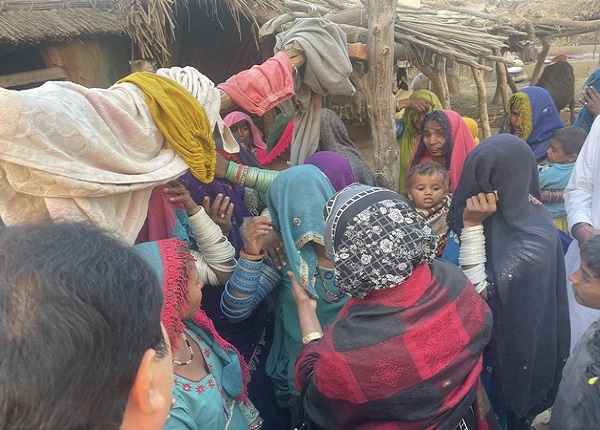India Calls On Pakistan To Protect Minorities After Killing Of Hindu Woman Daya Bheel In Sindh Province
India on Thursday called on Pakistan to protect its minorities after the killing of a Hindu woman Daya Bheel in Sindh province. Read on for details:

New Delhi: India on Thursday called on Pakistan to protect its minorities after the killing of a Hindu woman Daya Bheel in Sindh province. Speaking at the weekly media briefing of the Ministry of External Affairs, spokesperson Arindam Bagchi said, "We have seen reports about it, but we don't have specific details on the case, but we have reiterated that Pakistan should protect its minorities along with their safety, security and well-being, which is their responsibility."
There is outrage in Pakistan's Sindh after a Hindu woman Daya Bheel was brutally killed. Krishna Kumari, Senator of Pakistan Peoples Party from Tharparkar Sindh rushed to her village and confirmed the news of the brutal murder of the Hindu woman.
"Daya Bheel, 40-year-old widow brutally murdered and her body was found in very bad condition. Her head was separated from the body and the savages had removed the flesh from the whole head. Visited her village Police teams from Sinjhoro and Shahpurchakar also reached," she tweeted.
"Daya Bheel, who was brutally murdered -- her case won't be highlighted in the media, nor will Politicians in Islamabad or the Sindh government issue a statement. Will the police apprehend culprits? Will Hindus be treated as equal citizens in their motherland Sindh? tweeted The Rise News, a nonprofit news organization.
Also Read |
Opening of Kartarpur Corridor practical proof of Pakistan's desire for peace, says UN chief
Recently, the UK government this month imposed sanctions on its Muslim cleric Mian Abdul Haq for forced conversions and marriages of girls and women from religious minorities, according to a Toronto-based think tank.
The International Forum For Rights And Security (IFFRAS) said this latest sanction, once again highlighted the precarious situation of minorities in Pakistan. Sanction on Mian, described as a "controversial Sindhi pir" by Dawn, was part of a new wave of sanctions that targets corrupt actors, those abusing human rights, and perpetrators of sexual violence in conflict.
According to IFFRAS, Mian Abdul Haq was a Pakistan People's Party (PPP) lawmaker between 2008 and 2013. The party expelled him after the forced conversion and marriage of Rinkle Kumari, a girl from the minority Hindu community.
The pir, popularly known as Mian Mithu, is notorious in upper Sindh for his alleged involvement in the forced conversion and marriages of minor Hindu girls, according to the Pakistani newspaper Dawn.
Also Read |
Pakistani Hindu refugees hail passage of Citizenship (Amendment) Bill in Lok Sabha
The IFFRAS report said the UK sanctions effectively mean that designated individuals cannot do any business or undertake economic activity with UK citizens or companies and will be denied entry to the UK.
Activists say human rights in Pakistan have touched a new low with several media reports and global bodies reflecting the dire situation for women, minorities, children, and media persons in the country. In Sindh, forced conversions and attacks on minority communities have become even more rampant. Forced conversion of minor Hindu, Sikh, and Christian girls, always under duress, has become an increasingly common phenomenon in the country.
Earlier in November, the World Sindhi Congress (WSC) held the 34th International Conference on Sindh in London. Addressing the International Conference on Sindh, WSC chairperson Dr Rubina Shaikh, stressed that Sindh is witnessing the "worst period in history."
During the conference, the World Sindhi Congress urged international institutions including the United Nations to file a "case of ecocide" against the Pakistani government in local and international courts. "Sindh is going through the worst period in history. Sindhis have to make a joint, systematic and united struggle for the right to self-determination for their homeland," World Sindhi Congress announced in a statement on November 23 on Facebook. (ANI)
 Dynamite News
Dynamite News 